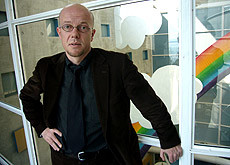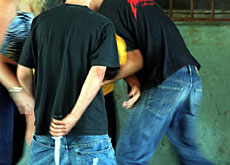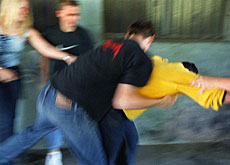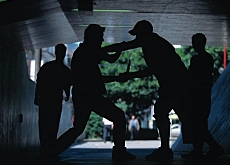Figures on crime to give accurate picture

Crime statistics, which are to be harmonised across Switzerland by 2010, will present a true picture of criminality, a cantonal police chief has told swissinfo.
The head of the Neuchâtel force, Olivier Guéniat, said that from then on it would be difficult to twist the figures for political ends.
Federal statistics on crime were first collected in 1982. Since then, each canton has developed its own method of collating data on penal code offences.
The cantons supply only global figures to the Federal Statistics Office.
Guéniat explains it was therefore necessary to find a single system to collect data on criminality at the federal level. After ten years of work, the project has now entered its final phase.
swissinfo: Will the work carried out over the past ten years to create a central system help make a proper assessment of the level of crime in Switzerland?
Olivier Guéniat: Let’s say that in 2010, we will have a snapshot of the situation in Switzerland for the previous year. But we will have to wait for a few more years to be able to evaluate the information and the trends in criminal activity.
It will probably need some time before the Federal Statistics Office can carry out a detached and objective analysis of the data. This will allow the office to paint an accurate picture of the trends on a national and regional level. The cantons will then be able to express themselves on issues that are specific to them.
This approach is important because crime has become a political issue. Thanks to the new system, it will be more difficult to manipulate the figures. It is quite sad to see that the media publish articles without digging a little bit deeper into the figures…
swissinfo: … notably on crime committed by foreigners because the statistics there are not so transparent, are they?
O.G.: At present, statistics on foreigners are a bit of a potpourri, without any distinction between those who have a residence permit of one kind or another and illegal immigrants. The only indication is the country of origin.
This is a very sensitive problem. When we ask for witnesses [to a crime], we have to issue a description of a suspect. Normally, we use the terminology used by Interpol and try to be politically correct.
But it’s true that things like “individuals of a black race” are written [in the media], whereas we write “individual of African type” if the person comes from that region. How would you describe an individual from Sri Lanka or southwest Asia? Should we write “a person of dark complexion” or “North African”? This is not harmonised within the Swiss police forces.
Another case is when we give out information on our activities, which we are obliged to do. Nationality should be of no interest. But as journalists systematically ask us the question we do it automatically, as well as give the age of suspects, so that we are not inundated with phone calls.
swissinfo: How long has there been political pressure on the police?
O.G.: After the French presidential campaign in 2002 which centred around lack of security, when lack of security was limited to marginalised areas, such as the suburbs.
Television in Switzerland picked this up and it became a political issue. There is the federal election this year and a simple comparison of the electoral programmes of parties to the left and right has convinced me that security is among the top five campaign issues, if not the top three.
swissinfo: But you never miss an occasion to claim that crime is not on the rise.
O.G.: It has generally remained stable since 1982. If you look at all the cantonal statistics, you can notice a drop in theft, and this is 25 times more common than bodily harm. We know almost everything about offences against public property because insurance companies demand a complaint before taking up the matter.
It is true that violent crime has, according to the statistics, risen. But these figures are very difficult to interpret.
The rise does not necessarily mean that fights between people are up but the reporting of incidents is, thanks to the advent of the mobile phone. This can provide proof, for example in cases when people receive threats by text message.
In addition, a complaint can result in statistics being distorted because of the way the data is collected. A person can file a complaint that he was hit, threatened and injured – this may count as three cases. An aggressor might also make an accusation that he felt threatened; a situation that leaves you with two victims and two offenders. This is the way in which the figures can be inflated.
When we have a better way of tracking offenders and victims, we can finally work out how many offences belong to the same case.
We can then probably prove that the rate of crime in Switzerland is the lowest in Europe. It might also show that there isn’t more violence today than 25 years ago and that youngsters or foreigners aren’t more violent than then.
I am working hard to put this message across to people, and to counter the words [used by journalists] that provoke fear.
swissinfo-interview: Isabelle Eichenberger
Police started collecting statistics on crime in 1982, with each canton developing its own collection and collating methods.
In 2006, the government, federal police and cantons decided to define a single method to collate data on criminality.
Cantonal police will unify their IT systems to improve the traceability of criminals throughout the country by 2009.
St Gallen, Appenzell Outer Rhodes, Zug, Thurgau, Obwalden, Nidwalden, Geneva and Basel City are prepared, while Neuchâtel will be ready by 2008.
Olivier Guéniat was born in Porrentruy in canton Jura in 1967. He studied for his doctorate at the School of Criminal Science at Lausanne University.
1992-1997: head of the Jura police forensic unit.
Since 1997: head of police of canton Neuchâtel.
April 24 2007: is to publish a book entitled Youth Delinquency.

In compliance with the JTI standards
More: SWI swissinfo.ch certified by the Journalism Trust Initiative



You can find an overview of ongoing debates with our journalists here . Please join us!
If you want to start a conversation about a topic raised in this article or want to report factual errors, email us at english@swissinfo.ch.